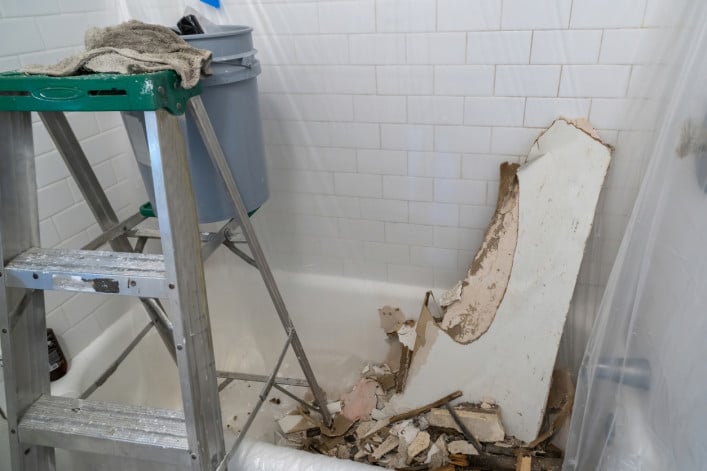Ask Altagracia: My bathroom ceiling collapsed and I'm worried about asbestos. Can I break the lease?
- Some leases have a break clause or a break can be negotiated for a fee
- Read the fine print if the landlord asks you to sign a release agreement

Address concerns about asbestos directly with your landlord or property manager. You can also call 311, the city’s complaints hotline. Do not try to clean up suspected asbestos yourself.
iStock
My bathroom ceiling collapsed after I warned the landlord about a leak. It's taking forever to fix and I'm worried about asbestos. Can I break the lease and get compensated?
Most standard leases have a clause dealing with what’s known as a casualty event that allows you to break your lease, such as a fire that partially or wholly destroys the premises. “The first thing to do is look at your lease to see if that clause exists and see how close it is to your circumstances,” said Altagracia Pierre-Outerbridge, attorney and founder of Outerbridge Law representing residential tenants, condo owners and landlords.
Potential health risks
Address concerns about asbestos directly with your landlord or property manager. You can also call 311, the city’s complaints hotline. Do not try to clean up suspected asbestos yourself.
New York state’s warranty of habitability gives tenants the right to a safe, livable apartment. “If a landlord refuses to fix a warranty of habitability violation, then you might have a case for a constructive eviction,” Pierre-Outerbridge said. This is where you move out because conditions are unlivable and then sue your landlord in housing court. Talk to a landlord-tenant attorney before you file a constructive eviction claim to make sure you don’t lose rights inadvertently.
Getting compensation or legal relief
If you continue to live in the apartment, withholding rent puts pressure on the landlord to make repairs. “If you are not willing to stay in possession in order to realize the value of the rent, the only other option is filing a lawsuit,” Pierre-Outerbridge said. However, she warns it will be “slow, expensive and uncertain.” If you believe you have a personal injury claim, you’d need a personal injury attorney.
Breaking your lease
If you decide you want to break your lease and move out, it’s important to make a very clear record of when you vacated the apartment and why. Best practice is to send a letter by certified mail to the landlord giving your landlord notice that you are terminating the lease under the applicable clause you’ve identified. If there is no relevant clause, you can say you are terminating the lease as of the last day of the following month.
“At that point the landlord has a statutory duty to mitigate damages,” Pierre-Outerbridge said.
This means a landlord is legally required to do everything to re-rent the apartment at no more than the rent you were paying. This reduces your damages. “If they re-rent for less than you were paying, they can come after you,” Pierre-Outerbridge said, although they are limited to seeking only the difference in the two rents.
Avoiding financial fallout from a lease break
Some landlords may ask you to pay a lease break fee and sign a mutual agreement that this suits both parties. A typical lease break fee is two months rent. Pierre-Outerbridge warned against signing any kind of broad release agreement that is weighted in favor of the landlord.
“Look at the language of that agreement to make sure you are not giving up your rights,” she said. Legal advice can help you ensure you understand the value of any personal injury claims you might have, especially if health issues arise later.
When you break a lease it is very important to move all your belongings out, return the keys, and make it clear you do not intend to return.
“If there is any uncertainty about whether you are still living at the apartment, the landlord can file an eviction case against you,” Pierre-Outerbridge said.
If you’ve left the apartment, but not given the keys back, and the landlord wins the case, you could be asked to pay the landlord’s losses. Making it obvious that you are handing back the apartment to the landlord protects you from this as well as any liability for damage to the apartment after you leave.
Altagracia Pierre-Outerbridge, Esq. is the owner of Outerbridge Law P.C, focusing primarily on tenant representation. The firm represents all sides in landlord-tenant litigation and transactional matters such as month-to-month holdovers, nuisance cases, licensee cases, harassment claims, repair cases, tenant buyouts, succession claims, DHCR overcharges and rent reductions and more. Pierre-Outerbridge has 15 years of experience litigating in Supreme, DHCR, and Housing Court. To submit a question for this column, click here. To contact Outerbridge Law P.C. directly, call 212-364-5612 or 877-OUTERBRIDGE, or schedule a meeting today.
You Might Also Like



























